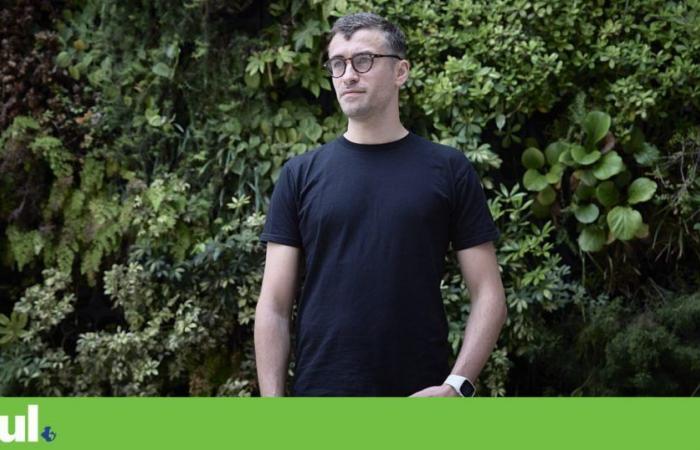The environmental footprint of artificial intelligence (AI) continues to increase. The expansion of data centers by companies such as Amazon, Meta and Microsoft, responsible for the servers behind ChatGPT, is worsening the climate crisis in the American Southwest, reveals a recent investigation by the magazine TheAtlantic.
At a time when drought in the region is forcing farmers to put fields fallow, these spaces use enormous amounts of water and energy to maintain low server temperatures. At the same time, the operation of the centers leads to the release of tons of carbon dioxide carbon. Portuguese Luís Cruz is one of the people looking for solutions to the problem that is not exclusive to the USA.
“At first, I just wanted to find out how I could do apps with AI that didn’t use up all the cell phone battery, but over time I realized that the area [da eficiência energética] it goes much further than that. O environmental impact of the use of AI on a global scale is enormous”, begins by explaining to PÚBLICO the computer scientist who is dedicated to discovering “greener” ways of creating computer programs in the Netherlands and founded the discipline of Sustainable Software Engineering at the University of Delft technology.
The specialist was recently in Portugal to raise awareness of the topic at the 46th International Conference on Software Engineering (ICSE), which took place at the Centro Cultural de Belém (CCB), in Lisbon.
The interest in sustainability energetics emerged about ten years ago when Luís Cruz was an intern at the former PARC laboratories, in Silicon Valley, in the USA. The Portuguese needed to create a app with AI to monitor physiological data and realized that it was necessary to start thinking about systems that consumed less energy.
“For data privacy reasons, we did not want to send information to external servers. Everything had to be processed on the cell phone”, he explains. “But a few years ago, cell phones had less capacity and AI systems were even more cumbersome. And nobody wants one app which will consume your cell phone battery in half an hour.” He decided to change his doctoral thesis to focus on the energy efficiency of new computer programs. Over time, she realized that the impact was much more significant.
George Rose/Getty
Scanpix Sweden / Reuters
“People don’t realize it right away because they only look at their individual impact. We need to look at the issue on a global scale”, she highlights. “Let’s imagine that using a cell phone consumes five watts of energy. It seems small, but if we think about the number of people with one or more cell phones, the number is much higher. And we arrived at values that show that using a cell phone costs the equivalent of several electricity plants like Fukushima.”
When When it comes to AI systems, he guarantees, the problem is even bigger. A group of researchers from Texas, USA, estimates, for example, that Microsoft used 700 thousand liters of fresh water to train the first model used by ChatGPT and chatbot from Microsoft, Copilot. The process also generated around 552 metric tons of carbon dioxide – the equivalent of the emissions from 120 combustion engine passenger cars in a year.
The solution is not to stop using artificial intelligence systems. “New AI tools can bring solutions to improve the areas of energy, health and transport. We have to ensure that the environmental price is lower”, reinforces the Portuguese expert.
For Luís Cruz, the responsibility lies with programmers and companies who must find ways to reduce environmental impact. It’s one of the reasons that led him to create the chair. engineering of Software Sustainable at the University of Delft. “We shouldn’t make people feel guilty about taking advantage of a given technology. The responsibility lies with whoever creates [desenvolve os programas]”, note.
Reduce, reuse, recycle
Solutions include creating smaller models, using the same model for different tools, and avoiding constantly updating AI systems with new knowledge. “Many AI tools are based on giant models that they do not fully use because they focus on very complex issues. specific”, argues the Portuguese. “There are smaller models that are just as effective as larger models.”
Luís Cruz defends the incorporation of the three R policy – reduce, reuse and recycle. “You need to think about reducing because you don’t always need an AI system. There are problems that are solved perfectly without AI,” he says.
Currently, it appears that there is a chatbot with AI for everything and everyone. In the first three months of 2023, after the launch of ChatGPT, the number of downloads in apps with “AI” in the name increased 1506% according to data from market analyst Apptopia, which led more companies to want to develop these systems. This is not always necessary: in situations where data does not change frequently and the task simply involves inputting information into a system, the complexity of AI is unnecessary. Traditional forms or spreadsheets, such as Excel, may be sufficient.
“Then there is the issue of reuse. Sometimes we can use the same small model for two different tasks”, continues the Portuguese Luís Cruz. “And we need to think about when we need to retrain a model. There are not always obvious benefits to updating a model.”
Another strategy, he suggests, is to inform users about the energy expenditure of the AI tools they use in real time. “Let us imagine that it was possible to see the energy expenditure of each question we ask a person. chatbot with AI?”, reflects. According to Cruz, this could motivate people to moderate the use of tools that are sometimes only used as spell checkers or thesauruses.
Sustainability as a brand
Despite the growing energy bill, Luís Cruz is optimistic about the development of more sustainable AI systems. It could be a way to make a difference, argues. “The creators of ChatGPT were brave because they were the first to make a model available to people. The technology is not new, but other companies were afraid to show what the technology could do. Now that the first step has been taken, several models from other companies are beginning to arrive, and one of the ways to stand out is with sustainability,” he theorizes.
In recent weeks, Meta (owner of Facebook, Instagram and WhatsApp) has integrated its own chatbot with AI, ChatGPT style, in several of its apps. The system, which has not yet reached the European Union, depends on the Llama model, available in open source. “It’s an interesting case because they share data on energy consumption [do Llama] in a transparent way. They realized that they had to find a differentiating factor aligned with society’s values,” she maintains.
Legislation can also help, but for Luís Cruz it is still insufficient. The AI law, recently approved by the European Union, promotes the development of codes of conduct for the environmental sustainability of AI systems (article 60), but does not detail how. “The AI Act is vague”, points out the Portuguese researcher. “It mentions that companies must adopt good practices to use resources efficiently, but without concrete measures”, he explains. Still, he admits, it is a starting point. “A The EU is a relevant market for many companies, so the fact that legislation tries to promote sustainability is an important step.”
Exploring the financial advantages may, however, be the best way to attract interest in the topic. “There are many financial gains”, emphasizes Luís Cruz. “The reality is that the electricity bill for training and using AI systems is brutal and, if we reduce it, the economic benefits are also great. We must take advantage of this duality to reduce environmental costs.”






